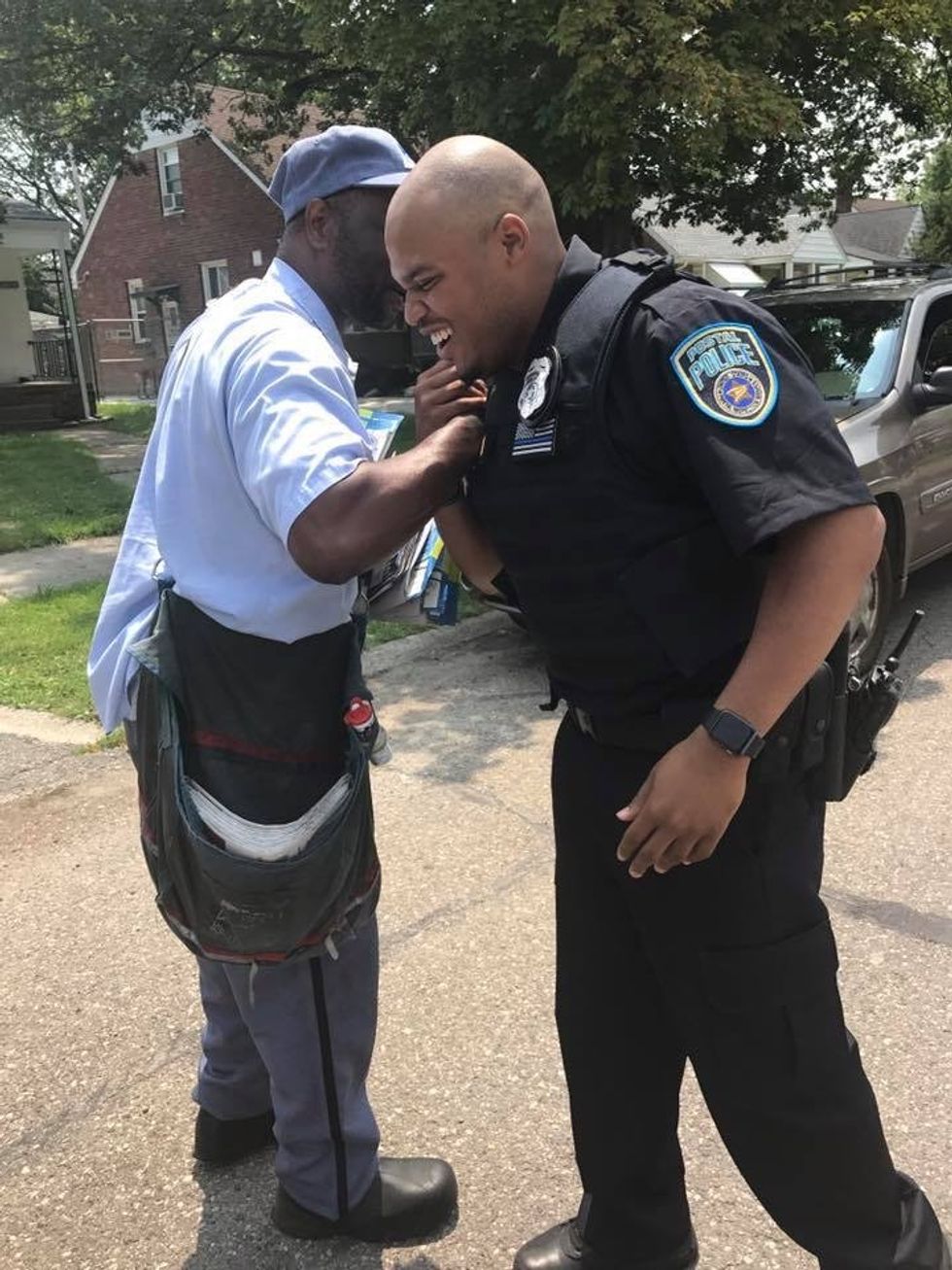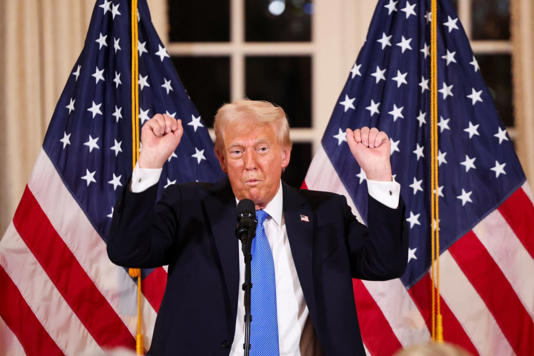Exclusive: Memo exposes DOGE's potential 'end game' for U.S. Postal Service
June 3, 2025

Donald Trump speaks next to Elon Musk and Musk's son in the Oval Office. REUTERS/Kevin Lamarque
While still under the leadership of Elon Musk, the Department of Government Efficiency (DOGE) consulted with the leader of a little known arm of the U.S. Postal Service (USPS), a memo obtained by Raw Story revealed — prompting legal and academic experts to warn of potential trouble ahead.
On March 19, Chief Postal Inspector Gary Barksdale issued a “situational update” to the U.S. Postal Inspection Service (USPIS), USPS’s law enforcement arm, about a meeting with DOGE, according to the memo, which Raw Story received through a Freedom of Information Act request.
In the memo, Barksdale reiterated former Postmaster General Louis DeJoy’s requests for assistance from DOGE as outlined in a March 17 letter to Congress, including help with “efforts to combat counterfeit postage.”
But Barksdale also provided a new recommendation “when [DOGE representatives] asked for specifics on how they could assist us,” asking for "administrative subpoena authority.”
The request “essentially allows for government agencies to issue requests, subpoenas, without any type of specific judicial intervention or judicial approval,” said Felix Shipkevich, a professor of law at Hofstra University.
The request surprised more than half a dozen experts who reviewed the memo.
“I think this foray into the postal inspector’s realm, into his office, is to put the postal inspector on notice that DOGE is looking at them,” said James O’Rourke, a professor of management at the University of Notre Dame’s Mendoza College of Business who studies the postal service.
“The endgame is the dissolution of the U.S. Postal Service. Parts will be sold, and it will be entirely privatized, if the current administration gets its way.”
DOGE aims to slash trillions of dollars from federal budgets, resulting in cancelled government contracts, thousands of redundancies at government agencies, and intense controversy over Musk’s access to federally held data.
The world’s richest man last week left the Trump administration to return to businesses including Tesla and SpaceX.
But DOGE remains active.
A USPS spokesperson did not respond to requests for comment. Representatives of DOGE and its House caucus could not be reached.
‘Mail theft epidemic’
USPIS is tasked with protecting the mail and investigating mail-related crimes. It employs more than 1,250 inspectors and nearly 450 police officers, according to its 2023 fiscal year report.
Mail theft and violent crimes against letter carriers have skyrocketed. Letter carrier robberies increased 543 percent in a three-year period, according to an exclusive Raw Story investigation.
In May 2024, the U.S. Government Accountability Office (GAO) issued a report calling on USPIS to better document decision-making processes in the wake of such a surge in mail-related crime.
USPS agreed with the GAO’s three recommendations, but they remain open a year later, said Derrick Collins, GAO’s director of physical infrastructure.
“They've told us that they're going to identify metrics or factors that they'll consider when making workforce decisions, but that's the extent of the information that we have at this point from them,” Collins told Raw Story. “They've not given us any additional details or timeframes.”
Asked if broader administrative subpoena authority could aid USPIS in investigating serious mail crimes, Collins said, “it did not come up in the course of our work, and we didn't explore it in part because it didn't come up.”
The U.S. Postal Service Office of Inspector General — an independent agency examining fraud, waste and abuse — also investigated USPS’s response to mail theft, finding ineffective efforts in stopping robberies of mail keys and collection boxes.
Tara Linne, a spokesperson for the USPS Office of Inspector General, told Raw Story the agency “didn’t address the administrative subpoena authority in any of our reports” and referred questions to USPIS.
The “mail theft epidemic” coincides with a 2020 statute reinterpretation restricting postal police officers to working on Postal Service properties, unable to intervene in mail crimes on the street, said Frank Albergo, president of the Postal Police Officers Association union (PPOA).
The PPOA and Postal Service remain in litigation about the jurisdiction of postal police officers.
“The Inspection Service now wants to essentially bypass the judicial process and then leave it up to themselves … they want to hoard investigative authority while they bench their own postal police force,” Albergo said.
“Think of how contradictory this is. So, their uniformed police officers don't have any authority to protect postal workers and mail, and yet their postal inspectors should have administrative subpoena power?”

A postal police officer in Detroit greets a letter carrier (Photo courtesy of the Postal Police Officers Association)
USPIS recently joined a Department of Homeland Security task force detaining and deporting undocumented immigrants, and participated in a drug and immigration enforcement raid in Colorado Springs alongside the FBI and IRS, the Washington Post reported.
“It’s a safe assumption that they would use this administrative subpoena authority to go after illegal immigrants,” Albergo said.
Albergo said both Democrats and Republicans in Congress were “really getting annoyed at the Inspection Service and mail theft,” adding: “It's just not going away that they have a police force that they refuse to use. What is the Inspection Service busy doing? They're busy asking for administrative subpoena power. If they were serious, they would ask for postal police power.”
‘Fishing expedition’
Approximately 335 executive branch agencies possess subpoena authority, including the Postal Service, according to a 2002 report to Congress by the Department of Justice, the latest available report.
That scope of authority extends to the postmaster general, said Harold J. Krent, a professor of law at the Illinois Institute of Technology who served in the Office of Management and Budget under President Joe Biden.
Barksdale’s request could signal an interest in “broader use of the subpoena power,” Krent said, adding: “They might want that enforcement authority to spread to more members of the agency.
“At the same time, if you have more agencies that have subpoena power, that then minimizes procedural protections that you might get from centralizing the power.”Krent said administrative subpoena authority is “incredibly important” and “a critical part of the arsenal agencies wield,” but “tensions” can arise if there are not “constraints for private parties, so that they're not fishing expeditions, there's not invasion of privacy.”
O’Rourke took Barksdale’s request to be “a fishing expedition, clearly.”
Shipkevich said administrative subpoena authority was a “very important power” but “overreach” can occur.
Whether DOGE should be involved in USPIS, and USPS overall, is up for debate.
Rick Geddes, a Cornell University economics professor who researches the Postal Service, said the agency had a “government-owned monopoly” over first-class and standard mail.
“It is unlawful to compete with the Postal Service in those areas — it's a crime. That's a recipe for inefficiency,” Geddes said, adding that there could be “a particularly useful role for DOGE to play in cases where a firm performs a fundamentally commercial service, and this is physical document delivery.”
Furthermore, the USPS reported a $9.5 billion loss in the 2024 fiscal year, compared to a net loss of $6.5 billion the year prior.
“A high fixed cost in the face of declining revenue in your core business is a recipe for losses, for fiscal instability,” Geddes said.
O’Rourke, however, said asking the Postal Service to turn a profit would represent a “downward” slope toward privatization of the mail and other agencies like the National Park Service and National Weather Service.
“We do not ask the Marine Corps to make money,” he said. “We don't ask the fire department to make money. We don't even ask them to break even because they don't. They can't.
“We're asking that of government services like the Postal Service. The demand is ‘start making money, or we'll take over and sell you, and we'll show you how to make money.’”
Barksdale said in the memo that USPIS and DOGE “share a common goal to eliminate unnecessary spending, identify redundancies and build efficiencies across organizations.”
Keith LaShier, a former president of the Association of United States Postal Lessors, said “it’s appropriate for the Postal Service to seek outside professional consultant help, on occasion.”
But LaShier, who has been a postmaster and worked in USPS finance, said it would be “very difficult for an outside entity” like DOGE to quickly resolve issues given that the Postal Service has “an endless number of stakeholders.”
“DOGE from what I've seen, just on a personal level, doesn't care what the stakeholders think,” LaShier said.
“It scares me as to what they might encourage the Postal Service to do or gain administration support to impose some changes that are not carefully thought out.”
O’Rourke said Barksdale’s meeting with DOGE was “concerning” and could signal a “principal way to get a foot in the door” as a path toward privatization, an effort reportedly advocated by DOGE and the General Services Administration.
“The sale and dissolution of the Postal Service would return us to the 1920s where there was no rural free delivery,” O’Rourke said.
“You can see, honestly, that it's the poor who will be disadvantaged the most.”
Alexandria Jacobson is a Chicago-based investigative reporter at Raw Story, focusing on money in politics, government accountability and electoral politics. Prior to joining Raw Story in 2023, Alex reported extensively on social justice, business and tech issues for several news outlets, including ABC News, the Chicago Sun-Times and the Chicago Tribune. She can be reached at alexandria@rawstory.com. More about Alexandria Jacobson.
.png)




